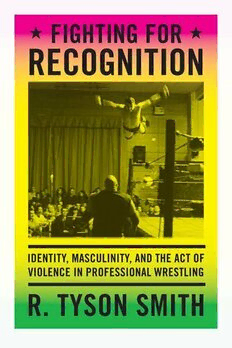
Fighting for Recognition: Identity, Masculinity, and the Act of Violence in Professional Wrestling PDF
Preview Fighting for Recognition: Identity, Masculinity, and the Act of Violence in Professional Wrestling
FIGHTING FOR RECOGNITION FIGHTING FOR RECOGNITION IDENTITY, MASCULINITY, AND THE ACT OF VIOLENCE IN PROFESSIONAL WRESTLING R. TYSON SMITH Duke University Press Durham and London 2014 © 2014 Duke University Press All rights reserved Printed in the United States of America on acid- free paper ∞ Typeset in Minion Pro by Graphic Composition, Inc. Library of Congress Cataloging-in-Publication Data Smith, R. Tyson. Fighting for recognition : identity, masculinity and the act of violence in professional wrestling / R. Tyson Smith. pages cm Includes bibliographical references and index. isbn 978-0-8223-5709-4 (cloth : alk. paper) isbn 978-0-8223-5722-3 (pbk. : alk. paper) 1. Wrestling—Social aspects—United States. 2. Wrestlers—United States. I. Title. gv1196.4.s63s65 2014 796.812—dc23 2014005681 Frontispiece photo copyright Mark Stehle Photography Cover photo by R. Tyson Smith I DEDICATE THIS BOOK TO ALL OF THOSE PEOPLE WHO FEEL COMPELLED TO FIGHT FOR RECOGNITION. WHETHER YOU ARE AN INDIE WRESTLER, VETERAN, INCARCERATED PERSON, OR ACADEMIC, MAY YOU FIND IT AS PAINLESSLY AS POSSIBLE. CONTENTS ACKNOWLEDGMENTS ix PROLOGUE xiii INTRODUCTION 1 CHAPTER 1: The Indies 9 CHAPTER 2: Fighting for a Pop: Wrestler Recognition 37 CHAPTER 3: Passion Work: The Coordinated Production of Emotional Labor 62 CHAPTER 4: “In Real Life I’m a Total Homophobe”: Wrestlers Managing the Male Gaze 89 CHAPTER 5: Pain in the Act 115 CONCLUSION 147 APPENDIX A: How It Began 155 APPENDIX B: Rage Wrestlers/ Participants 167 NOTES 171 REFERENCES 197 INDEX 211 ACKNOWLEDGMENTS First and foremost, I thank all of the wrestlers who shared their lives with me. I am truly grateful for their openness, vitality, and passion. I hope that they appreciate this work despite my critical stance. After the wrestlers, there is no one I thank more than Justine Stehle. She supported me in countless ways for what felt like a countless number of years. She’s one of the sharpest and most focused in the bunch, and her insights were invaluable. Thank you, Justine, for always keeping things in perspective and for reveling in the wrestling world (almost as much as I did). Michael Schwartz changed my relationship to sociology and, subse- quently, life itself. I cannot thank him enough for always believing in me. I have never known anyone as accomplished, influential, and skilled as he is (nor so lacking in the unfortunate pretenses that often accompany these qualities). Thank you, Michael, for being a loving, fatherly friend. I hope one day to be able to offer my students the devotion, wisdom, and love that you give yours. No one has done as much to help me bring this book through to com- pletion as Javier Auyero. Thank you, Javier, for being so attentive, so thor- ough, and so damn quick to write back—and for letting me take full ad- vantage of your great mind! You have been the epitome of reliability. You inspired me to do ethnography and always to work harder and go further. I’m very grateful for your mentorship and fantastic energy. If I produce even a quarter of the high-q uality scholarship you produce, I will consider myself an academic success. Not sure what you run on (other than maté), but I want some. Thank you, too, to Michael Kimmel for his important
